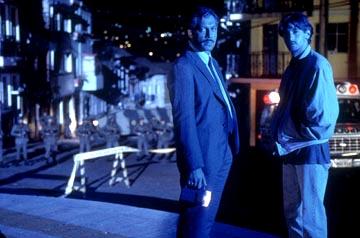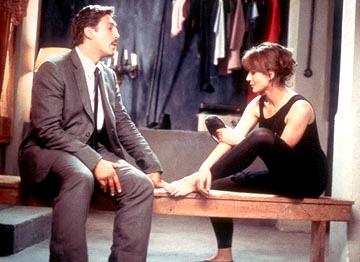

It seems like every actor and their mom in recent months is coming out with their directorial debut. The quality of these films from people like Nicholas Cage, George Clooney, Matt Dillon, and Denzel Washington pretty much run the gamut, with John Malkovich's The Dancer Upstairs coming in near the top of the pile. The film, adapted by Nicholas Shakespeare from his own novel, details a political uprising in a Latin American nation as seen through the eyes of a policeman, Rejas (Javier Bardem, Second Skin, Before Night Falls). Rejas used to be a lawyer, and is one of the few people in this country who is not corrupt. The Dancer Upstairs works because of its moral ambiguity. Malkovich (Knockaround Guys, Hotel) and Shakespeare continually have their characters question the value of right and wrong.
Rejas is assigned to investigate Ezequiel, the only name the police have behind a series of suicide bombings. Ezequiel is either a person or movement, behind a revolution against the political leaders. The bombings are becoming more dangerous, and more people are going over to Ezequiel's side. Ezequiel has lost confidence in the ability of the government, which is corrupt. It doesn't help matters that the more Ezequiel does, the closer the country moves towards martial law. This places huge burden on Rejas, who believes it is his burden to capture Ezequiel. For one, if the government finds Ezequiel first, they will kill him. At the same time, Rejas is having some marital problems, and finds himself attracted to Yolanda (Laura Morante, The Son's Room, Vajont).
Although this romance becomes a crucial part of the plot, it feels like the most unnecessary. It's never too clear what Rejas' marital problems are or why he is drawn towards Yolanda in the first place. This romance doesn't become interesting until near the end of the film. The romance between the two mirrors the plight of the country. It is very easy for those in power to become corrupt, and Yolanda serves as the potential catalyst that can turn Rejas against all he believes in. The other problem with The Dancer Upstairs is Bardem's accent. He's a great actor, but it is sometimes more than impossible to understand what the heck he is saying.
This should not discount his performance. Bardem channels a lot of frustration through Rejas, who is fighting an uphill battle. He has little to go on in terms of clues, and every wasted moment means more people die. Even when the government confiscates his files and takes him off the case, he still presses forth. It's nice how Malkovich actually takes the time to show how an investigation proceeds. It's also good seeing ethnic actors, rather than white ones, portraying ethnic characters. It lends a little more realism to the proceedings. Now, the next step is to film it with subtitles, instead of having all the actors speak English with accents.